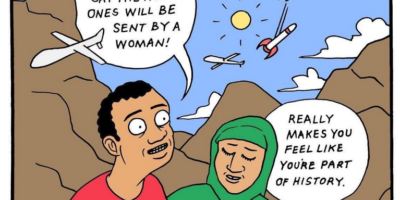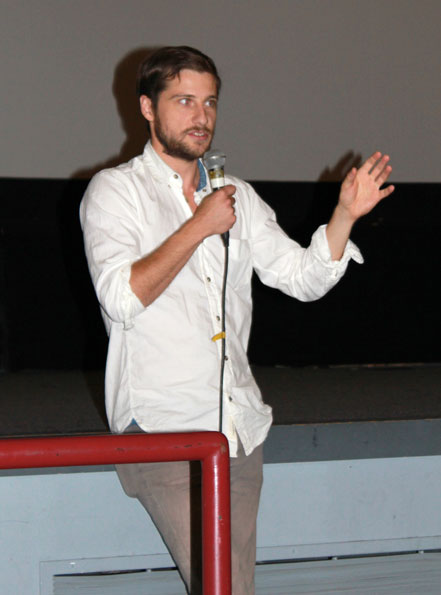Audley proves that success is possible in a midsize city—even Memphis
By Lucy Jones
One of Tennessee’s most celebrated film directors has a name more evocative of that state’s neighbor to the north. Kentucker Audley (nee Andrew Nenninger, for those who might remember his face from the halls of Lexington Catholic) adopted the moniker when he claimed Tennessee as his new home. “When I moved to Memphis, I wanted to keep Kentucky with me,” explains the 29-year-old writer, director, and actor.
Indeed, Audley has maintained his Kentucky roots. Recently, he proved Thomas Wolfe wrong by returning to his hometown of Lexington for a screening of his third directorial feature, Open Five. The sixty-three minute, largely improvisational film was shown on September 27 at the Kentucky Theatre as part of the 2011 Boomslang Festival.
Thom Southerland, a Lexington resident and accomplished filmmaker in his own right, had suggested the film as a perfect fit for the festival’s focus on new, independent, and cutting-edge artists. Having first seen Open Five on the festival circuit while screening his own work, Southerland was impressed by the raw candor of Audley’s latest movie.
”The first time I saw it I was struck by the film’s patience, how Kentucker took his time telling his story,” explains Southerland. “The underlying tension and emotional complexity kind of sneaks up on you. I think future generations will look at films like Open Five and other so-called ‘low-budget’ films as more honest, accurate depictions of our present times than a hundred Diablo Cody or Aronofsky films.”
Mumblecore
It is this commitment to veracity, partnered with character driven storytelling and the stripped down aesthetic of lower budget filmmaking, which has led film critics (fairly or not) to associate Audley with the mumblecore film “movement.” For those not familiar with the term, mumblecore is a genre seemingly more defined by what it isn’t than what it is. Unlike traditional Hollywood fare, a mumblecore picture eschews fancy set pieces, convoluted plot points, highly stylized direction, special effects and/or explosions (an amusing backyard firecracker scene in Open Five notwithstanding) in favor of a naturalistic approach to exploring character relationships.
As happens with any loose-knit conglomeration of similarly minded artists, the filmmakers associated with mumblecore have swiftly found themselves pigeonholed for the sake of media convenience. A recent Huffington Post article did everything short of anointing Audley as mumblecore’s voice of the South, and glowing reviews of Open Five in The New Yorker and Variety couldn’t help but reference the film in relationship to its ascribed genre.
Of course, the already loose term has become increasingly diffused of meaning with every evolving entry into the perceived cinematic order. According to media definitions, mumblecore films are heavily dependent on improvisation (except when they’re not), are about twenty-somethings (except when they’re not), and utilize non-professional actors (except when they don’t). When Aaron Katz’s latest film, Cold Weather, was heralded as mumblecore’s “first thriller,” the parameters of a genre previously marked by its dismissal of conventional plot structure became even more nebulous than they were before.
Audley doesn’t mind being associated with filmmakers who he respects, but has always felt like he was on the fringes of what others deemed mumblecore. He also believes that the term, as a defining concept, is on the decline. “People still say the word, but I don’t think it’s being treated as a movement anymore.”
What interests Audley is following his own filmmaking style, one which focuses on exploring how real people react to one another in (almost) real situations. “My first film, Team Picture, was scripted,” states Audley. “But my last three films [the sequel to Open Five is in post-production] have been entirely improvised. My primary focus is to make films that feel real, even at the expense of story or a clear ‘point’.”
Audley credits the ability to make the kind of films he wants, in part, on the early support and encouragement of the Memphis Digital Arts Co-operative. The media co-op, born when the desire of a dedicated group of filmmakers aligned with the availability of a free space in a neighborhood church building, was an organization for people interested in giving how-to knowledge and hands on help in exchange for shared equipment.
“Memphis Digital Arts was very important in my life,” explains Audley. “It was the first time I was around serious filmmakers who were actively pursuing a life of filmmaking. It was several things—a theater where we could show our work and get feedback and have premieres; it was office space where we could write and edit; (and) it was a meeting spot, where we could have workshops and meet and greets.”
A Lexington film co-operative?
Thom Southerland has long believed that a similar model could work in Lexington. Familiar with the success stories that have emerged from Memphis Digital Arts, Southerland is interested in creating a Lexington film co-operative where filmmakers can give their time (via class instruction and/or production support) in exchange for the use of shared equipment.
“Lexington’s art scene is growing in many ways,” says Southerland. “But we’re still in the mindset that luring Hollywood here with big budget films about horses is the only real filmmaking—as if a film can only be made with thousands of extras, famous actors with large trailers, and lots of stressed-out looking people from bigger cities. But film, as much if not more than any medium, has been altered by the digital revolution. Access to the tools of filmmaking is no longer for the privileged few.”
Southerland cites increased affordability and easier access to film equipment as an encouraging trend for local filmmakers. “It’s a great time for Lexington to embrace this revolution. We can give people the tools to tell their stories here and share them with the world. The spirit of the co-op is one of artistic support mixed with hard work. We really are all in this together. The idea is to succeed on a more local scale. Find your audience here, and you will find it in larger venues eventually.”
Audley agrees that Memphis’ co-operative model could have equal success elsewhere. “It’s definitely possible in other cities. It could be any scope. It could start with three people. It could start as simply as borrowing each other’s equipment and making short films as exercises.”
Audley’s support of a localized film community extends beyond production. In order to be economically successful, films must be seen. In this spirit, Audley has been exploring out-of-the-box distribution models that will allow local, independent films to be viewed nationally. His new website, nobudgefilms.com, arose from such a desire. On the site, for free or by a small rental price, films can be viewed by people who otherwise would not have access to them.
“I released my film, Open Five, on my website last fall and it was a success,” explains Audley. “Five thousand people watched the film in three weeks, and we were covered by legitimate publications like The New Yorker. It was fine to host it on my personal website, but I thought it would have been a better experience if it felt more communal, if there were other films around. There weren’t any websites of this nature (that released films straight-to-internet) so I started one.”
When asked his criteria for selecting films for the site, Audley explains: “I pick films that excite me, that feel fresh.”
By creating alternative film distribution methods, Audley helps empower local filmmakers to remain in the communities that support them. “Hopefully, it becomes more and more possible to scrap by in mid-size cities. I love New York and L.A. but I don’t wanna live there.”
Lexington, take notice.




Leave a Reply